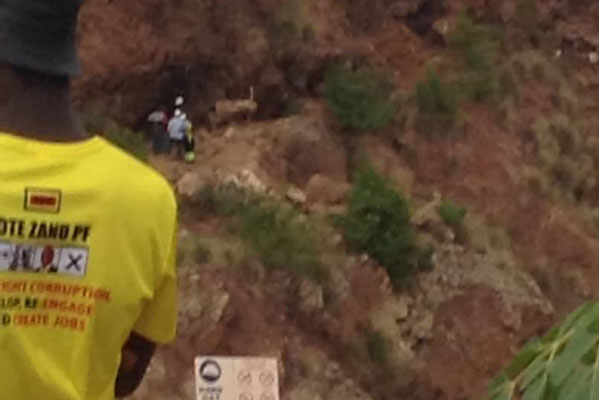
AN investigation by the auditor general Mildred Chiri revealed that a number of mining operations across the country do not adhere to occupational health and safety regulations, exposing miners to dangerous working conditions.
By Richard Muponde
Chiri said she audited the mines after a series of reports highlighting poor occupational health and safety standards in mining operations.
The release of the report this month coincided with three deadly mine disasters in Bindura, Chegutu and Esigodini where a number of miners were trapped underground after shafts they were working on collapsed.
In Bindura, authorities are working overtime in an effort to rescue 30 miners trapped underground at Ram Mine after the shaft they were working on collapsed. Six miners had been rescued alive on Friday, but hopes that the remaining men would be brought back to the surface alive continue to diminish as rescuers have to contend with flooding and lack of reliable equipment.
An unknown number of miners have been trapped underground at a mine in Esigodini for the past two weeks after the shaft collapsed.
Their relatives are losing hope that they would be rescued alive after the government abandoned the rescue mission, citing unfavourable conditions.
Five miners died underground at a Chegutu mine in September after they were also trapped underground.
- Chamisa under fire over US$120K donation
- Mavhunga puts DeMbare into Chibuku quarterfinals
- Pension funds bet on Cabora Bassa oilfields
- Councils defy govt fire tender directive
Keep Reading
Chiri’s audit findings painted a gloomy picture of the mining industry in the country after the tens of mines that were investigated showed scant regard for safety issues.
The government’s capacity to enforce safety regulations and the availability of disaster recovery equipment was questioned.
“Some mines would use methods of mining that are harmful or dangerous to workers resulting in fatal accidents and contraction of diseases,” Chiri said in her report.
“Non-availability of vehicles for the inspectorate department has been identified as one of the reasons why accidents have remained high, especially in small and medium-scale mines.
“Without vehicles, inspectors are unable to regularly visit mines to check adherence on a number of issues, including occupational health and safety.
“Also the method used to allocate vehicles was not in tandem with workload and fulfilling objectives of the department.”
The government’s chief auditor said lack of equipment was forcing mine inspectors to use professional judgement instead of technical verifications.
“The Mines and Mining Development ministry did not have any disaster recovery strategy or equipment to use during disasters at mining operations.
“For instance, in Matabeleland North, inspectors resorted to borrowing from Turk Mine equipment which assisted them during mine accidents that would have occurred in the province.
“If the ministry does not have testing and disaster recovery equipment and plan, there’s high risk that in the event of a disaster they could not help.
“The ministry may certify defective material and using a naked eye to make conclusions on the state of equipment may compromise the results.”
An audit of 51 mines in six provinces revealed that improper handling and storage of explosives was “more prevalent with small and medium-scale compared to large scale miners.
“From inspections carried out at 28 small-scale mines in the six provinces, I noted that all of them were not properly handling explosives,” Chiri said.
At 37 of the 51 mines that were visited, workers were not provided with adequate personal protective equipment.
The problem was common among small to medium-scale miners, she said.
Simiso Mlevu, the Centre for Natural Resources Governance communications and project officer, said the government must step up the monitoring of mining operations to prevent accidents.
“There is need for proper mine closure as well as the revival of the economy,” Mlevu said.
“Artisanal miners are forced by the ailing economy to risk their lives because they don’t have sustainable sources of income.
“They then took advantage of shafts of mines left open by large-scale miners.”
Zimbabwe Diamond Mining Workers’ Union secretary-general Justice Chinhema said an upsurge in illegal mining activities was to blame for the rising number of accidents in the industry.
“The causes of these disasters are several,” Chinhema said.
“Most abandoned or closed mines have of late been invaded by illegal miners who don’t have mining expertise; therefore, they mine and destroy mine pillars that support mines.
“Too much rainfall and most mines have become weak and soils are no longer able to sustain or support the operations.
“Underdevelopment of mines by mine owners who are not organised, they don’t want to invest in mine development, but only taking money.”
The unionist said corrupt mine inspectors were making the situation in the mining sector more dangerous.
“Corruption by mining officials especially the inspectorate department. They are not inspecting mines; they are getting bribes and fail to execute enforcement,” Chinhema said.
“And now what we think should be done is the formalisation of all small to medium mines.
“However, this is being resisted by criminals who always thrive through informal activities.
“Corruption needs to stop through revamping of the whole inspectorate department.”
Chinhema said the government should also invest in awareness campaigns, education and training of small to medium miners as they lack mining knowledge.
Nobuhle Mabhikwa, a programmes officer at the Zimbabwe Environmental Law Association, said there was need for behavioural change in the mining sector to curb accidents.
“There needs to be a mind and behavioural shift among the miners when it comes to issues of safety,” Mabhikwa said.
“Money is important, but lives matter more.
“There might be a need to form a task force that can respond to these accidents in areas where mining is happening.”
Mines minister Winston Chitando did not respond to questions sent to him.











